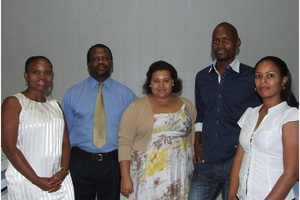CAfGEN receives $3 million grant to study progression of TB and HIV
The Consortium for African Genomics Network (CAfGEN), made up of University of Botswana, Makerere University, Baylor College of Medicine, Baylor Uganda Children’s Foundation and the Botswana-Baylor Children’s Clinical Centre of Excellence, has been awarded a $3.0 million three-year grant from the National Institutes of Health of the United States of America to study the genetic factors that affect the progression of TB and HIV in sub-Saharan Africa.
Effective January 2014, the money will enable researchers to begin land-breaking work on children; one of the largest populations infected with the disease yet to be studied.
The grant will also establish the recently formed CAfGEN whose goal is to create a collaborative, multi-disciplinary, multi-institutional, inter- and intra-country network of African scientists, clinicians, and researchers to use genomics approaches to study gene/pathogen interactions for HIV/AIDS, its co-morbidities, and other diseases among diverse paediatric African populations. Two of the five CAfGEN collaborating sites - the Botswana-Baylor Children’s Centre of Excellence and the Baylor-Uganda Children’s Clinical Centre of Excellence – are affiliated to the Baylor International Pediatric AIDS Initiative (BIPAI) of the Baylor College of Medicine in Texas, USA.
The key role of Baylor College of Medicine is to capacitate scientists from the African institutions in the field of genomics and bioinformatics. Baylor College of Medicine has a long history of genetics and genomics expertise and is home to one of only three Human Genome Sequencing centres in the United States. CAfGEN will draw on the genomics academic expertise at Baylor College of Medicine (BCM), the needs and commitment of two African academic institutions and synergise these with extensive clinical educational expertise and the availability of the largest cohorts of HIV infected children in Africa to create a unique collaborative network. There is very strong commitment to CAfGEN by all participating institutions and support from the BIPAI leadership and respective ministries of health.
“Most of the previous genetic studies in HIV were undertaken in non-African, adult populations,” said Dr. Gabriel Anabwani, executive director of the Botswana-Baylor Children’s Centre of Excellence and the lead principal investigator of the grant. “There is a great need to study the genetic factors of progression in children because their disease differs considerably from their adult counterparts and they potentially have more to gain from therapeutic advances.”
“Advanced genetic and genomic technologies have the promise to transform our understanding and approach to health and human diseases,” said Dr. Graeme Mardon, Professor of Molecular and Human Genetics and Pathology & Immunology at BCM and Principal Investigator of the BCM portion of the grant.
The team will use state-of-the-art genomic technologies to study a rare group of HIV-infected children who can control the infection for years without needing anti-retroviral therapy to prevent AIDS. They will also be following a group of HIV positive children infected with tuberculosis (TB) to identify new genes associated with disease progression. Their ultimate goal is to offer improved diagnostics and new therapeutic avenues in TB and HIV/AIDS.
The clinical centres will provide expertise for patient recruitment while the universities will provide local molecular genetic resources. BCM, home to one of the top-rated genetics programs in the United States, will bring to the partnership access to genomics expertise and resources that will ultimately be transitioned to African researchers and institutions through an extensive training program designed to develop highly-knowledgeable geneticists in African nations.
Other Principal Investigators include Drs. Oathokwa Nkomazana and Sununguko Mpoloka from the University of Botswana; Dr. Moses Joloba from Makerere University and Dr. Adeodata Kekitiinwa from the Baylor-Uganda Children’s Clinical Centre of Excellence.
“This grant provides Botswana with a great opportunity to develop and entrench local expertise in the area of genomics research. We are really excited and look forward to starting this work,” said Dr Sununguko Mpoloka of the University of Botswana. “However, although it is a great start, this important grant does not provide everything we need as a country to develop rapidly in this area. Therefore we will be looking for additional local resources to compliment areas that are not fully covered by this grant”, added Dr Oathokwa Nkomazana of the University of the Botswana School of Medicine.
The grant will help establish core genomics facilities in Botswana and Uganda, with trainees from those institutions having the chance to work in several highly-regarded core laboratories at BCM including the Human Genome Sequence Center, the Laboratory for Translational Genomics in the Children’s Nutrition Research Center, and the Center for Statistical Genetics.
“The excitement of this grant is not only the potential for improved care in childhood HIV, but the improvements in knowledge and infrastructure that will serve the people of Africa for many years to come,” said Anabwani.
Source: University of Botswana


